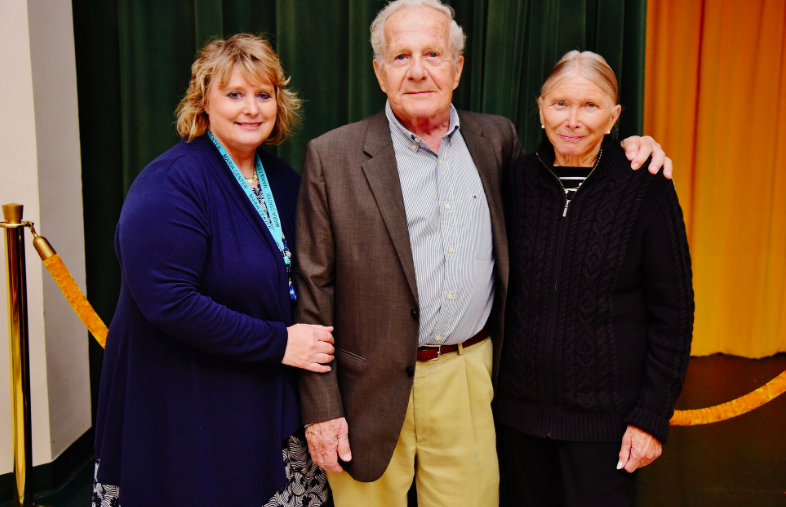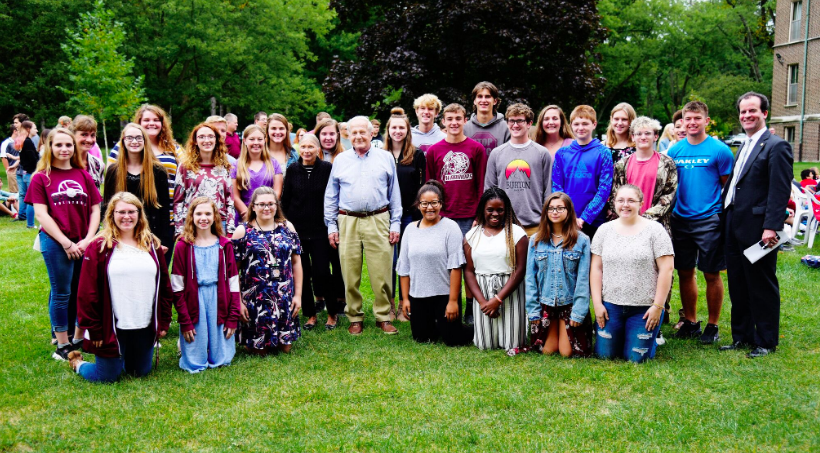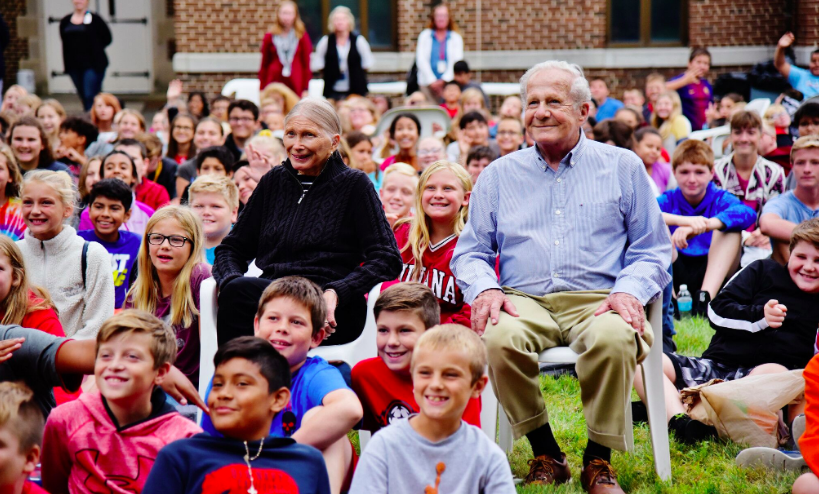Holocaust Survivor Frank Grunwald Recounts Incredible Story
Photographer / Jubilee Edgell
 When Nazi troops invaded Czechoslovakia in 1939, Frank Grunwald was six years old, living a comfortable life in Prague with his older brother and parents, Vilma and Kurt.
When Nazi troops invaded Czechoslovakia in 1939, Frank Grunwald was six years old, living a comfortable life in Prague with his older brother and parents, Vilma and Kurt.
“We didn’t live in a scrumptious, exaggerated way, but my father was a physician so we were upper-middle class,” Grunwald says.
The following year, the family was expelled from their apartment and Grunwald and his brother expelled from public school. Three years later, the family was transported to Terezín, a Jewish concentration camp. Grunwald’s family was placed in a Czechoslovakian family camp that was set up in Auschwitz/Birkenau, which was established when news leaked to the general European population that Jews were being killed in gas chambers by the thousands. Panicked German officials, in an effort to establish credibility, forced the prisoners to pen postcards that stated that they were alive and well. The truth, however, was that the transports who came from Terezín to Auschwitz were scheduled to live for six months prior to execution.
“The code SH stood for ‘Special Handling’ and it meant you were to be killed after six months,” Grunwald says.
In July of 1944, Grunwald’s family was up for medical selection. Those in their 30s or 40s who were healthy had a chance of survival, but children under 14 and adults over 55 were automatically sent to the gas chamber, as were those who were crippled, like Grunwald’s 16-year-old brother, who was born with a congenital leg defect.
“When [Nazi concentration camp doctor] Josef Mengele saw that my brother walked with a limp, he automatically put him on death row,” Grunwald says.
When his mother learned her son was to be executed, she volunteered to stay with him. Five days later, on July 11, 1944, Grunwald’s mother, brother, and grandmother were put to death.
Grunwald would have suffered the same fate had it not been for a German prisoner whom Grunwald worked for as a messenger. Since he liked Grunwald, he physically pushed him into an older group of boys, thereby saving his life.
Just prior to entering the gas chamber, Vilma handed a German guard a letter and requested that he deliver to her husband. Remarkably, he did and it now resides at the United States Holocaust Memorial Museum in Washington, D.C. According to the museum’s chief acquisitions curator, the letter is the only such document ever created that was written from Auschwitz in the moments prior to gassing.
Grunwald’s father was moved to a medical camp while Grunwald, 11, was taken to a men’s camp. To manage his anxiety from being separated from family, Grunwald often fantasized about sitting around the dinner table with his family, feasting on beef and mashed potatoes.
“That wishful thinking helped me survive,” he says.
In January 1945, with news that the Russian army was nearing, thousands of Auschwitz prisoners were evacuated and forced to walk the Death March.
“It was called the Death March because if you couldn’t walk, you were shot,” says Grunwald. And they were grueling walks because they were given no food or water.
When Auschwitz was being evacuated, the prisoners walked to the Gleiwitz railroad station and were transported to Mauthausen Concentration Camp in Austria where Grunwald spent the following four months in three other camps. The last Death March was to the Abendsee Caverns.
“There were 5,000-6,000 of us and they were walking us to the caverns to shoot us because they didn’t want the German population to witness the shootings,” Grunwald says.
The SS ran out of time and dropped prisoners off in the Gunskirchen make-shift camp in the woods near the village of Gunskirchen. There, after almost one week, they were liberated by the U.S. Third Army on May 4, 1945. Grunwald was taken to Austria where he stayed for six weeks. His father later found him. It was a bittersweet reunion when Grunwald learned that both his brother and his mother had been killed.
To help him heal, he focused on art and music just as he did in Auschwitz.
 “My brother and I would hum and sing American jazz songs like Stormy Weather and Sweet Lorraine to transport ourselves mentally to another world,” says Grunwald, who is currently working on a musical/documentary called Sweet Lorraine in Auschwitz with the Butler University jazz band that will debut on March 28 on Butler’s campus.
“My brother and I would hum and sing American jazz songs like Stormy Weather and Sweet Lorraine to transport ourselves mentally to another world,” says Grunwald, who is currently working on a musical/documentary called Sweet Lorraine in Auschwitz with the Butler University jazz band that will debut on March 28 on Butler’s campus.
A retired product designer who worked for GE for 25 years, Grunwald lives in Indianapolis with his wife Barbara. He teaches a class at Purdue each spring semester in the school of product design. Grunwald, who has two children and five grandchildren, has spoken to close to 100 high schools and many universities and churches. Last month, Grunwald spoke at The Center at Donaldson where nearly 800 people came to the campus to hear his incredible story. Five hundred of those in attendance were students from Ancilla College, as well as other local schools. Becky Anspach, Resident Manager of Maria Center Independent Living, noted that Grunwald’s visit brought much awareness and education to those students.
“We heard many of the students telling Frank that they will never forget him,” Anspach says. “That’s why it’s important to keep his story alive.”
The Maria Center, an independent senior living center and part of the Catherine Kasper Life Center (CKLC). CKLC is part of The Center at Donaldson and is a ministry of the Poor Handmaids of Jesus Christ. Through all of these endeavors, he hasn’t accepted payment.
“I never felt it right to monetize my Holocaust experience,” says Grunwald, who admits that it’s tough to recount his experiences time and again.
“It’s emotionally draining, but I feel that it’s my duty to be the voice for those who aren’t here,” says Grunwald, 87.
He says his most interesting audience question came from a 13-year-old boy who, after hearing his miraculous story, inquired, “When you were going through all of this, did you ever feel sorry that you were Jewish?”
Grunwald shook his head.
“I never thought to feel sorry for myself,” he says. “I felt like this whole thing was a mistake made by the people who were persecuting us.”
To learn more about Frank Grunwald’s story, watch his documentaries “Misa’s Fugue” and “They Played for Their Lives.”







Comments 2
Hi Mr. Frank (Misa) So Sad That Your Mom, Brother And Grandmother Went Through All That Hate In The Camps, They Wanted To Hide, But They Didn’t Want To. It’s Not Fair And They Didn’t Deserve To Be Killed. So Glad That Soldier Gave The Letter To Your Father. So Awesome That Your Still Alive , But I Know You Miss Your Mom And Your Brother And Grandmother Vey Very Much.